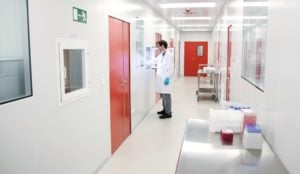Bridging the gap for production of nanopharmaceuticals - towards commercialisation of experimental HIV-vaccine
Nine European companies and research institutes combine forces in the NanoPilot-project to create a pilot plant aimed at accelerating the development of nanomedicine by facilitating the production of small clinical batches under Good Manufacturing Practice (GMP). One of the first three nanopharmaceuticals chosen for production in the pilot plant is a promising intranasal HIV vaccine.
A pilot plant capable of producing batches of HIV-vaccine suitable for clinical trials in humans will be set up in the EU-funded NanoPilot-project. The plant will be adapted from existing high-quality laboratories already owned by the project coordinator, Spanish research institute Cidetec. The end goal is to establish a certified plant specialized in the production of clinical batches of polymer-based nanopharmaceuticals, operating under Good Manufacturing Practices (GMP). At the end of the 48-month project, a batch of the HIV vaccine will be produced and shipped to clinical trials.
Despite decades of prevention effort and education, the AIDS epidemic still rampages on. One of the most important reasons for the difficulty of stopping AIDS is the lack of an effective vaccine. With previous studies showing that traditional vaccination approaches are ineffective with HIV, innovative solutions are needed. An intranasal nano-based HIV vaccine has shown positive results in animal studies, and the next step on the road to wide-spread application of the vaccine is clinical trials.
However, for human use, the amount and quality of the vaccine required is vastly different from that of the pre-clinical animal studies. Suitable amounts of GMP quality nanopharmaceuticals cannot be easily produced either in the laboratory or existing pharmaceutical manufacturing plants, which are optimised for the production of large amounts of traditional drugs. The pilot plant set up within the NanoPilot-project aims to fill this gap.
Nanopharmaceutical help for bladder pain and dry eyes
 The plant will be a flexible and adaptable production facility for small batches of various types of polymer-based nanopharmaceuticals. The versatility of the plant will be demonstrated in two other applications: a nanomedicine for painful bladder syndrome and a novel topical treatment for pain associated with dry eye syndrome. The production process of the three products is differ greatly from one another, which will help demonstrate the flexibility of the pilot plant.
The plant will be a flexible and adaptable production facility for small batches of various types of polymer-based nanopharmaceuticals. The versatility of the plant will be demonstrated in two other applications: a nanomedicine for painful bladder syndrome and a novel topical treatment for pain associated with dry eye syndrome. The production process of the three products is differ greatly from one another, which will help demonstrate the flexibility of the pilot plant.
Once completed, the plant will become a vital tool in the commercialisation of nanopharmaceuticals, enabling SMEs and academic institutions to validate their innovations in the field of nanomedicine. SMEs and research institutes are expected to become key players in the development of novel nanodrugs, however, they often lack the resources to upscale the production of their potential nanomedical innovations. The pilot plant established in the NanoPilot project will address this need.
About NanoPilot
The NanoPilot-project is coordinated by the Spanish research institute, Cidetec. The project will combine the efforts of four research institutes and universities: Cidetec, National University of Ireland Galway, Universidad Santiago de Compostela and ADERA-UT2A; three SMEs: iX-Factory, Mejoran and Spinverse; and two large industrial partners, Chemtrix BV and Sylentis, a pharmaceutical company and subsidiary of the Zeltia Group. Spinverse will be partaking in the project by creating and developing the pilot plant’s business plan, and supporting the project’s exploitation and dissemination efforts.
The project started in January 2015 and will continue for 48 months until December 2018, funded by the European Union within the Horizon 2020 framework programme. The total budget of the NanoPilot project is 6,3 MEUR.
Read more on NanoPilot's website and on nanowerk.com.
Read our reference on NanoPilot!
Photo (c) Cidetec
